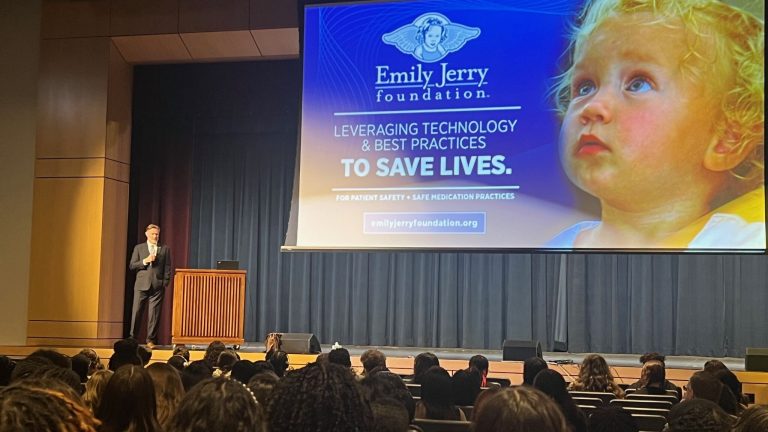
Emily Jerry was nearly ready to go home from a Cleveland hospital. The grapefruit-size tumor in her abdomen seemed gone, and the 2-year-old with blond ringlets and blue eyes was getting one last round of chemotherapy just to make sure.
Instead, the treatment killed her. A pharmacy technician at Rainbow Babies and Children’s Hospital mixed Emily’s chemotherapy drug with a saline solution 26 times above normal. The pharmacist on duty didn’t catch the error. Soon after getting the drug, Emily was on life support. She died three days later, on March 1, 2006.
On Tuesday, a House bill that would set mandatory education, training and regulatory standards for all pharmacy technicians, is scheduled to be introduced by Rep. Steven LaTourette, R-Ohio. He calls it Emily’s Act.
A similar proposal in Emily’s home state, Ohio, is expected to be considered this year by state lawmakers. And next month, the American Society of Health-System Pharmacists plans a drive for tougher standards for technicians, who in many states need prove only that they are high school graduates with no criminal record.
Emily’s parents, Kelly and Christopher Jerry, are at the forefront of the crusade for tougher standards for the workers typically responsible for entering prescriptions into computers, checking dosages and getting the correct drugs into medication containers. They say the circumstances of Emily’s death lend urgency to their cause.
“It would have been a whole other story if the cancer would have been responsible,” says Kelly Jerry, an activist and former school teacher in Concord Township, Ohio. “But to know that she died in this horrific way she did, we can’t live with ourselves until we help make changes so this doesn’t happen to another family.”
Emily’s parents say a USA TODAY series published earlier this month drew new attention to the cause by highlighting technician errors not caught by pharmacists.
Born in February 2004, Emily was diagnosed with a curable form of cancer when she was 18 months old. She underwent surgeries and four rounds of chemotherapy to eradicate the tumor growing from the base of her spine. The treatment worked, and Emily was expected to go home disease-free just after her second birthday.
Her parents planned a Disney World celebration trip with Emily and her older brother and sister.
Instead, Emily awoke crying on Feb. 28, grabbing her head in pain and vomiting. She died three days later.
An Ohio pharmacy board investigation showed that pharmacy technician Katherine Dudash had made a tragic error. According to a notarized statement Dudash wrote for the board, she prepared Emily’s chemotherapy bag with a 23.4% saline solution, 26 times the 0.9% normally used. Pharmacist Eric Cropp didn’t catch the mistake.
The board revoked his license last year over the incident and a string of later errors. In August, an Ohio grand jury indicted Cropp on charges of reckless homicide and involuntary manslaughter “in the death of Emily Jerry.”
Arguing that Cropp is innocent, defense attorney Richard Lillie has filed motions to dismiss the case, which is expected to go to trial later this year. Lillie says the charges raise “all sorts of land mines for health care professionals” who make unintentional errors.
Dudash, in her statement, wrote that she told Cropp, “This doesn’t seem right,” after preparing the intravenous solution for Emily’s chemotherapy. Cropp “shrugged it off,” she wrote. Joann Predina, a pharmacy board investigator, found Dudash had spent time on the Internet “planning her wedding” during a lull before the error.
Cropp, in his own notarized statement to the board, wrote that he had been rushed, “which caused me to miss any flags that Katie had done something wrong.”
Unlike Cropp, Dudash has not faced disciplinary action or prosecution. In part, that’s because Ohio is among at least 11 states that do not regulate pharmacy technicians. In Ohio, “The technician has no legal responsibility. It all falls back on the shoulders of the pharmacist,” says Tim Benedict, assistant director of the state’s pharmacy board.
After the fatality, Dudash returned to the CVS (CVS) drugstore chain, where she had worked and passed a technician training program before landing the hospital job. CVS spokesman Michael DeAngelis says she now holds a non-pharmacy job and would not grant interviews.
LaTourette, the congressman, says Americans “would be a little bit dismayed if they knew that they and their loved ones were having drugs mixed for them by people who don’t have any training requirements.”
His bill would make federal grants available to states that require all technicians — in hospitals, retail stores and other settings — to pass the national training exam administered by the Pharmacy Technician Certification Board. It would also require reporting of prescription errors to state pharmacy boards and limit the number of technicians supervised by a single pharmacist.
LaTourette says he will seek co-sponsorship from 20 members of Congress with constituents who were injured or died from errors by pharmacy technicians. He says the proposal has the backing of actor Dennis Quaid, whose newborn twins mistakenly were given 1,000 times the usual dosage of a blood thinner in November at Cedars-Sinai Medical Center in Los Angeles.
A hospital investigation showed technicians failed to follow hospital policies in checking the drug’s strength. The twins recovered. Quaid’s attorney, Susan Loggans, said the actor and his family “support the regulation of people in the health care field who are not certified.”
LaTourette is optimistic his bill will become law. But it likely faces an uncertain congressional reception in a presidential election year. Pharmacy operators are expected to oppose it as unnecessary and too costly.
Sen. Timothy Grendell, R-Ohio, who introduced the state legislation, said that measure has drawn “quiet resistance” from pharmacy lobbyists over the proposed pharmacist-to-technician ratios and the prospect of higher salaries for technicians who meet the tougher standards. Supporters say they hope the planned campaign by the 35,000-member pharmacist group will help overcome opponents’ arguments.
“I think they realize in light of what happened to Emily … that something is going to get done,” says Grendell.
“We want people like us to be able to protect themselves and be able to protect their families,” says Christopher Jerry. “The only way we can see to do this right now, immediately, is with the public outcry Kelly and I are trying to produce.”
Article written by Kevin McCoy and Erik Brady, USATODAY.com. It was originally posted on 2/24/2008.
Original article can be found here.




 A former Cleveland area pharmacist got jail time in connection with the death of a toddler.
A former Cleveland area pharmacist got jail time in connection with the death of a toddler.
 Channel 3 News has learned that Pharmacy Technician Katie Ferg-Dudash, who mixed a fatal dose of Sodium Chloride that killed 2-year-old Emily Jerry is working at a local CVS Pharmacy.
Channel 3 News has learned that Pharmacy Technician Katie Ferg-Dudash, who mixed a fatal dose of Sodium Chloride that killed 2-year-old Emily Jerry is working at a local CVS Pharmacy.


Last Updated: February 21, 2018 by ejfadmin
Follow us on Twitter and Facebook!
The Emily Jerry Foundation is now on your favorite social media sites. Click the icons below to access our respective pages on Twitter and Facebook.